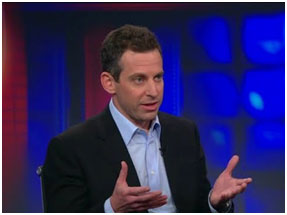TRANSLATE THIS ARTICLE
Integral World: Exploring Theories of Everything
An independent forum for a critical discussion of the integral philosophy of Ken Wilber
 David Christopher Lane David Christopher Lane, Ph.D.
Professor of Philosophy, Mt. San Antonio College Lecturer in Religious Studies, California State University, Long Beach Author of Exposing Cults: When the Skeptical Mind Confronts the Mystical (New York and London: Garland Publishers, 1994) and The Radhasoami Tradition: A Critical History of Guru Succession (New York and London: Garland Publishers, 1992). SEE MORE ESSAYS WRITTEN BY DAVID LANE
Inside Outside
Sam Harris' Dilemma or Why Consciousness
is a Mobius Strip in a Dyadic Melody
David Lane
Therefore, although science may ultimately show us how to truly maximize human well-being, it may still fail to dispel the fundamental mystery of our mental life. That doesn't leave much scope for conventional religious doctrines, but it does offer a deep foundation (and motivation) for introspection. Many truths about ourselves will be discovered in consciousness directly.
--Sam Harris
"But sometimes I think it's just like an on-off switch. Click and you're gone.”
--Steve Jobs
Is the very notion of a “scientific” study of consciousness oxymoronic from the start? Or, is it just one half of a Mobius-like endeavor that can never succeed unless the fundamental subjectivity inherent in such self-reflective awareness also takes central stage in what appears to be dyadic melody, where being the instrument and listening to the instrument are indissolubly intertwined?
 Sam Harris
Sam Harris
Sam Harris, the first of the four famous horsemen of atheism (his first book, The End of Faith, has been credited with sparking the nascent neo-atheist movement now sweeping throughout the USA and abroad), has in a recent two part article ["The Mystery of Consciousness"] strongly argued that consciousness is a mystery that resists an objective scientific explanation.
As Harris writes,
“The problem, however, is that no evidence for consciousness exists in the physical world. Physical events are simply mute as to whether it is “like something” to be what they are. The only thing in this universe that attests to the existence of consciousness is consciousness itself; the only clue to subjectivity, as such, is subjectivity. Absolutely nothing about a brain, when surveyed as a physical system, suggests that it is a locus of experience. Were we not already brimming with consciousness ourselves, we would find no evidence of it in the physical universe—nor would we have any notion of the many experiential states that it gives rise to. The painfulness of pain, for instance, puts in an appearance only in consciousness. And no description of C-fibers or pain-avoiding behavior will bring the subjective reality into view.”
Of course Dennett and Churchland (Tufts University and UCSD respectively) have a different take and Harris readily admits this when he writes,
“And, again, I should say that philosophers like Daniel Dennett and Paul Churchland just don't buy this. But I do not understand why. My not seeing how consciousness can possibly be an illusion entails my not understanding how they (or anyone else) can think that it might be one. I agree, of course, that we may be profoundly mistaken about consciousness—about how it arises, about its connection to matter, about precisely what we are conscious of and when, etc. But this is not the same as saying that consciousness itself may be entirely illusory. The state of being utterly confused about the nature of consciousness is itself a demonstration of consciousness.”
The mystery of consciousness in Harris' purview is very simply, even if ultimately profoundly, obvious to those with this all-pervasive feeling of awareness. We are inside looking outside and when we flip the proceedings to understand the former with the latter we find something elemental missing in the equation. And so we should, since the very dualism of speaking of in/out by necessity brings an impassable confusion to the proceedings. To understand consciousness, Harris reasons, necessitates being conscious and therein lies the difficulty of trying to get an “outside” handle of what in terms of lived through experience has no separable exterior as such.
The first person cannot be translated into a third person descriptive narrative without losing the very essence of what it is to be aware. Yes, Harris admits, that we can learn much about the brain and all sorts of correlative things that occur within our skull when we are conscious, but the qualia doesn't transfer wholly to any sort of reductive explanation. Harris explains further,
“For these reasons, it is difficult to imagine what experimental findings could render the emergence of consciousness comprehensible. This is not to say, however, that our understanding of ourselves won't change in surprising ways through our study of the brain. There seems to be no limit to how a maturing neuroscience might reshape our beliefs about the nature of conscious experience. Are we fully conscious during sleep and merely failing to form memories? Can human minds be duplicated or merged? Is it possible to love your neighbor as yourself? A precise, functional neuroanatomy of our mental states would help to answer such questions—and the answers might well surprise us. And yet, whatever insights arise from correlating mental and physical events, it seems unlikely that one side of the world will be fully reduced to the other.”

In a comparative way I have found this same conundrum in surfing. Whenever I sit on the beach and watch the waves at one of my favorite surf haunts, I mind-surf it, imagining that I am bottom turning, lip launching, or getting deeply buried within the tube. Yet, for all the times I have “objectified” being in the ocean and simulating that I am sliding down an almond shaped cylinder, it is doesn't come close to actually being in the water and being immersed into the liquid lines. I have often tried to explain to my two young sons what it is actually like to be inside a hefty tube, but no matter how detailed or refined my tale may be, I know from my own experience that unless they have a tube ride themselves such third person objectifications will not provide the necessary subjective encounter� try as I might.
Describing an experience is, to Harris' view, not the same as being the experience, regardless of how sophisticated our neuroscience becomes. It is for this reason that Sam Harris has championed exploring consciousness via direct introspection. In a rich and pregnant article entitled, “What's the Point of Transcendence?” Harris opines,
“Transcendent experiences, in so far as they are usually temporary, are often surrounded by a penumbra of other states and insights. Just as one can glimpse deeper strata of well-being, and briefly see the world by their logic, one can notice the impediments to feeling this way in each subsequent moment. There is no question that all of these mental states have neurophysiological correlates—but the neurophysiology often has subjective correlates. Understanding the first-person side of the equation is essential for understanding the phenomenon. Everything worth knowing about the human mind, good and bad, is taking place inside the brain. But that doesn't mean that there is nothing to know about the qualitative character of these events. Yes, qualitative character can be misleading, and certain ways of talking about it can manufacture fresh misunderstandings about the mind. But this doesn't mean that we can stop talking about the nature of conscious experience. At one level, there is nothing else to talk about.”
To be sure, Harris is not introducing anything new here, except that it is refreshing to read an atheistic neuroscientist giving voice to a millennial old mystical tradition of exploring the source of awareness by focusing on awareness itself.
But what is it that makes the subject of consciousness recalcitrant to explanation, particularly when science has been so successful in explaining such vagaries as the process of genetics and the formation of galaxies?

Perhaps the Mobius strip is a useful, albeit limited, metaphor here to invoke since its unusual properties on first sight boggle the mind: “a surface with only one side and only one boundary component. It has the mathematical property of being non-orientable.” Analogously, the difficulty we have with studying consciousness is precisely that we cannot communicate what it is without losing the very quality that makes it such. Imagine that you wanted to convey what it was like to dream to someone who never dreamt and only had access to a waking state. How could you communicate dreaming without dreaming itself? Harris suggests strongly that you cannot and that any attempt to circumvent the obvious is simply unintelligible. How can one convey something that is non-orientable to that which is only orientable, if one has to forego the very thing that would communicate it?
Isn't the breakdown of consciousness (which is strategically speaking the reductionistic paradigm of Crick, Churchland and others) precisely the problem, since it breaks apart the very thing that must be experienced as a gestalt?
Consciousness isn't a thing to be described among other things, since it is the context, not the content, of what is experienced.
The Mobius strip is, by definition, an endless surface and any attempt to reorient it (by definition again) transforms it into that which it is not. Isn't consciousness akin to this very definitional paradox? My very attempt to correlate it or analogize it or reduce it or explain it simply upends a genuine understanding of what it is to experience it, since consciousness isn't a thing to be described among other things, since it is the context, not the content, of what is experienced. More precisely, consciousness cannot be exported as a piece of content, since it is a whole context in which such appearances arise. My attempts to reduce that holism to parts ipso facto means that whatever follows will be irretrievably “lost” in translation. If I understand Sam Harris correctly, I think this is what he is driving at when he writes,
“The problem, however, is that the distance between unconsciousness and consciousness must be traversed in a single stride, if traversed at all. Just as the appearance of something out of nothing cannot be explained by our saying that the first something was 'very small,' the birth of consciousness is rendered no less mysterious by saying that the simplest minds have only a glimmer of it.”
Or, in more paradoxical (but illuminating) phrasing, Harris contends that we are merely deluding ourselves if we think we have solved the mystery of consciousness by our sleight of hand language shuffling. Harris writes,
“Likewise, the idea that consciousness is identical to (or emerged from) unconscious physical events is, I would argue, impossible to properly conceive—which is to say that we can think we are thinking it, but we are mistaken. We can say the right words, of course—“consciousness emerges from unconscious information processing.” We can also say “Some squares are as round as circles” and “2 plus 2 equals 7.” But are we really thinking these things all the way through? I don't think so. Consciousness—the sheer fact that this universe is illuminated by sentience—is precisely what unconsciousness is not. And I believe that no description of unconscious complexity will fully account for it. It seems to me that just as “something” and “nothing,” however juxtaposed, can do no explanatory work, an analysis of purely physical processes will never yield a picture of consciousness. However, this is not to say that some other thesis about consciousness must be true. Consciousness may very well be the lawful product of unconscious information processing. But I don't know what that sentence means—and I don't think anyone else does either.”
Tellingly, when Sam Harris attempted to convey such a sentiment to Daniel Dennett (the third—or is that the second?—atheistic horseman), the latter be musingly responded that
“if I can't imagine the falsehood of the above statement, I'm not trying hard enough. However, on a question as rudimentary as the ontology of consciousness, the debate often comes down to irreconcilable intuitions. At a certain point one has to admit that one cannot understand what one's opponents are talking about.”
Perhaps Wittgenstein should make an entrance here and suggest that the real difficulty in studying consciousness is a language issue and that some things simply cannot be addressed by our symbolical logical systems. Was Wittgenstein providing us with a prescient warning shot on studying self-reflective awareness when he concluded his 1919 Tractatus Logico-Philosophicus with, “Whereof one cannot speak, thereof one must be silent.”?
Or was Sir Arthur Eddington echoing a similar observation when he wrote,
“All through the physical world runs that unknown content, which must surely be the study of our consciousness. Here is a hint of aspects deep within the world of physics, and yet unattainable by the methods of physics. And, moreover, we have found that where science has progressed the farthest, the mind has but regained from nature that which the mind has put into nature. We have found a strange foot-print on the shores of the unknown. We have devised profound theories, one after another, to account for its origin. At last, we have succeeded in reconstructing the creature that made the foot-print. And Lo! It is our own.”
Perhaps the study of consciousness has an inherent limitation, similar in import to Heisenberg's uncertainty principle in quantum mechanics or Godel's incompleteness theorem in mathematics. Perhaps we are like seasoned travelers on a Mobius strip in quest of the “other” side of the band who after long and arduous circular travels come to realize that no matter what route we take we will always only be touching the same surface. If this is so, then a specialized version of Niels Bohr's complementarity may be an instructive insight for us as we venture forth: “In any given situation, the use of certain classical concepts excludes the simultaneous meaningful application of other classical concepts.”
In the study of consciousness it appears we may have to confront an epistemological complementarity where any objective study (via third person analysis) of qualia must by necessity lose in translation a fundamental feature of the very phenomenon under inspection. Conversely, any purely subjective endeavor to explore consciousness must by its very act forego any attempt to maximally objectify what is experienced, lest the experience itself be lost in attempting to exteriorize that which is de facto interior.
A broken down melody is, to quote one distinguished musician, no longer a melody. Similarly a broken down consciousness is no longer itself and therein lies the Sam Harris dilemma.
For Further Reading:
Sam Harris , “The Mystery of Consciousness“, http://www.samharris.org/blog/item/the-mystery-of-consciousness/
MSAC Philosophy Group, “The Body That Surfs: Theories, Waves, and Philosophy”, http://www.magcloud.com/browse/issue/287409
Niels Bohr, “On Complementarity”
|
 David Christopher Lane, Ph.D.
Professor of Philosophy, Mt. San Antonio College Lecturer in Religious Studies, California State University, Long Beach Author of Exposing Cults: When the Skeptical Mind Confronts the Mystical (New York and London: Garland Publishers, 1994) and The Radhasoami Tradition: A Critical History of Guru Succession (New York and London: Garland Publishers, 1992).
David Christopher Lane, Ph.D.
Professor of Philosophy, Mt. San Antonio College Lecturer in Religious Studies, California State University, Long Beach Author of Exposing Cults: When the Skeptical Mind Confronts the Mystical (New York and London: Garland Publishers, 1994) and The Radhasoami Tradition: A Critical History of Guru Succession (New York and London: Garland Publishers, 1992).

